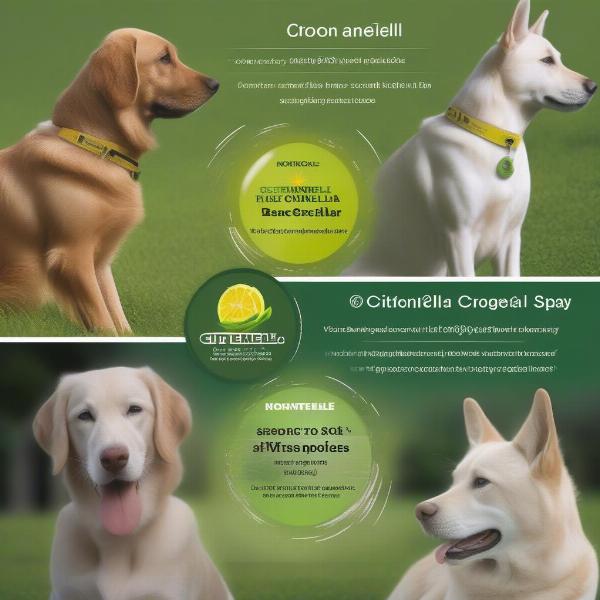Citronella dog collar spray is a popular training tool used to deter unwanted barking. This guide explores the effectiveness, safety, and proper usage of citronella spray collars, addressing common concerns and offering practical advice for dog owners considering this option. We’ll delve into how these collars work, the potential benefits and drawbacks, and alternative training methods.
Understanding Citronella Dog Collar Spray
Citronella spray collars work by releasing a burst of citronella-scented spray near the dog’s nose when they bark. The scent, derived from the citronella plant, is generally unpleasant for dogs, interrupting their barking and redirecting their attention. While some owners worry about the safety of these collars, the spray is generally considered harmless. However, it’s crucial to choose a high-quality product and use it correctly.
Benefits and Drawbacks of Citronella Spray Collars
Citronella spray collars can be an effective tool for curbing excessive barking, especially when used in conjunction with positive reinforcement training. They offer a humane alternative to shock collars and can be particularly useful for dogs who bark excessively when left alone. However, these collars aren’t a one-size-fits-all solution. Some dogs might become desensitized to the citronella scent over time, while others might experience anxiety or fear.
Are Citronella Collars Cruel?
This is a common question among dog owners. The short answer is no, citronella collars are generally not considered cruel. The spray is designed to be a deterrent, not a punishment. However, improper usage or choosing a low-quality product can be harmful. Always follow the manufacturer’s instructions and consult with a veterinarian or certified dog trainer if you have concerns.
Choosing and Using a Citronella Spray Collar
Selecting the right citronella spray collar is crucial for its effectiveness and your dog’s safety. Look for collars with adjustable straps, refillable spray canisters, and a bark-activated sensor. When introducing the collar, start gradually and pair it with positive reinforcement. Reward your dog for quiet behavior and avoid using the collar for extended periods.
 Different Types of Citronella Collars
Different Types of Citronella Collars
Alternatives to Citronella Spray Collars
While citronella spray collars can be helpful, other training methods can be equally effective. Positive reinforcement, desensitization, and counter-conditioning are proven techniques for addressing excessive barking. These methods focus on addressing the underlying cause of the barking and teaching your dog alternative behaviors. [dog collar that stops barking](https://ilmdog.com/dog-collar-that stops-barking.html) offers a variety of options. You could also consider tick spray for dogs or fly deterrent for dogs for other pet care needs.
Conclusion
Citronella dog collar spray can be a valuable tool for managing excessive barking when used responsibly and in conjunction with other training methods. Understanding the benefits, drawbacks, and proper usage is key to ensuring its effectiveness and your dog’s well-being. Remember to always prioritize your dog’s comfort and safety, and consider consulting with a professional for personalized guidance.
FAQ
- How long does a citronella spray collar last? The lifespan of a citronella spray collar depends on the frequency of use and the size of the canister. Typically, a refill can last for several weeks.
- Are citronella collars safe for puppies? While generally safe, citronella collars are not recommended for very young puppies. Consult your vet before using one on a puppy.
- Can citronella spray cause allergic reactions in dogs? While rare, some dogs might be sensitive to citronella. If you notice any skin irritation or other allergic reactions, discontinue use immediately.
- What if my dog becomes desensitized to the citronella spray? If your dog becomes desensitized, consider other training methods like positive reinforcement or consult with a dog trainer.
- Can I use a citronella spray collar on my cat? Citronella spray collars are specifically designed for dogs and should not be used on cats. flea collars for dogs are available for dogs and other products for cats.
- Is citronella spray harmful to humans? The citronella spray is generally considered safe for humans, but avoid direct contact with eyes.
- Can I use a citronella spray collar in conjunction with other training tools? Yes, you can use a citronella spray collar alongside positive reinforcement and other training methods. tick spray dogs can also be used safely in conjunction with citronella spray collars.
ILM Dog is your trusted resource for comprehensive dog care information. We offer expert advice on everything from breed selection and training to health and nutrition. Whether you’re a seasoned dog owner or just starting your journey, ILM Dog provides the knowledge and resources you need to care for your canine companion. Contact us today for personalized support: [email protected] or +44 20-3965-8624. We specialize in Breed selection, Health & Medical care, Training & Behavior, Nutrition & Feeding, Grooming & Hygiene, and Products & Accessories. Find out more at ILM Dog.